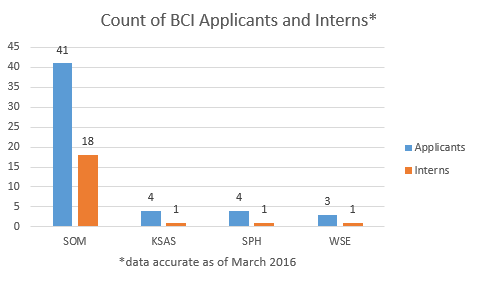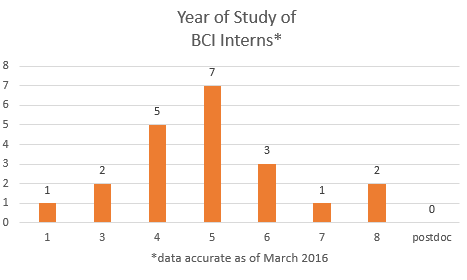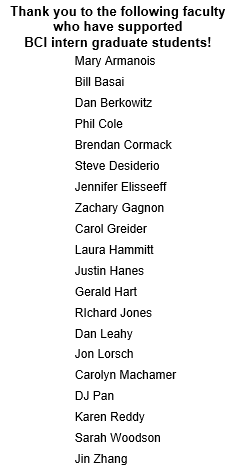As the number of Ph.D.-level scientists and competition for jobs in academia increase, biomedical graduate students are well served by the opportunity to explore non-academic careers. BCI serves this need for Hopkins graduate students through its internship program, the cornerstone of BCI. BCI facilitates internships for Ph.D. students in fields outside academic research, such as R&D in biotech or pharmaceutical companies; technology transfer; science policy; science administration; science education; and scientific writing. Our goal is to provide students the opportunity for hands-on experience in their field of interest so that they are able to better understand their career goals and actively work toward professional success.

Eligibility
Advanced Ph.D. candidates at Johns Hopkins University are eligible to apply for a BCI internship.
Why Support the Exploration of a Non-Academic Career?
Graduate biomedical training should reflect the realities of the workforce
According to an NIH biomedical research workforce working group report, “less than half of US-trained biomedical PhDs go on to a career in academia. Almost a quarter conduct research in industry or government settings and almost one fifth are in science-related occupations but do not conduct research (e.g. program and review officers at NIH or managers in the biotechnology industry).”[i] In addition, the proportion of PhDs that move into tenured or tenure-track faculty positions declined from ~34% in 1993 to ~26% in 2012. Despite this reality, much of graduate biomedical training continues to focus on preparing students for a career in academia.

Graduate biomedical training should reflect the interests of its students
A study conducted amongst 469 basic biomedical sciences doctoral students at the University of California, San Francisco showed that 41.7% of first-year students indicated primary investigator at a research-intensive institution as the primary career choice. This number dropped to 25% in the third year, with interest in other research careers, teaching and education, and non-research careers increasing from 42.9% to 57.9%.[ii] There are multiple reasons that might explain this broad change in career interests. The NIH workforce working group report suggests that a decline in interest in academic careers could be attributed to the long PhD and postdoctoral training period, increased age at which researchers obtain a faculty position, and disparities in early-careers earning and life-long earning potential compared to other scientific disciplines.
Why Support a BCI Internship?

You have some control.
Before a student can apply for an internship, they must submit an Intent to Apply Form signed by both the PI and the program director. The form lets BCI know that all parties are aware of the student’s intent to pursue an internship, should s/he receive an offer from one of the internship host organizations. When completing this form, you – the PI – are also given the opportunity to stipulate conditions that must be met before the student is allowed to pursue an internship.
The timing is flexible.
The timing of the internship is flexible. Typically, the internship lasts 3 months. You and the student can work to determine when is the most suitable time to take a leave from the lab. The time away will not count toward the student's time to degree.
The cost is free.
A BCI intern’s stipend and health insurance are fully covered. Neither the PI nor the program is responsible for this funding.
The outcomes are overwhelmingly positive.
Please visit our Outcomes page for details.
[i] National Institutes of Health. Biomedical Workforce Working Group Report (NIH, 2012).
[ii] Fuhrmann, C.N., Halme, D.G., O’Sullivan, P.S., & Lindsteadt, B. CBE Life Sci. Educ. 10, 239-249 (2011).
